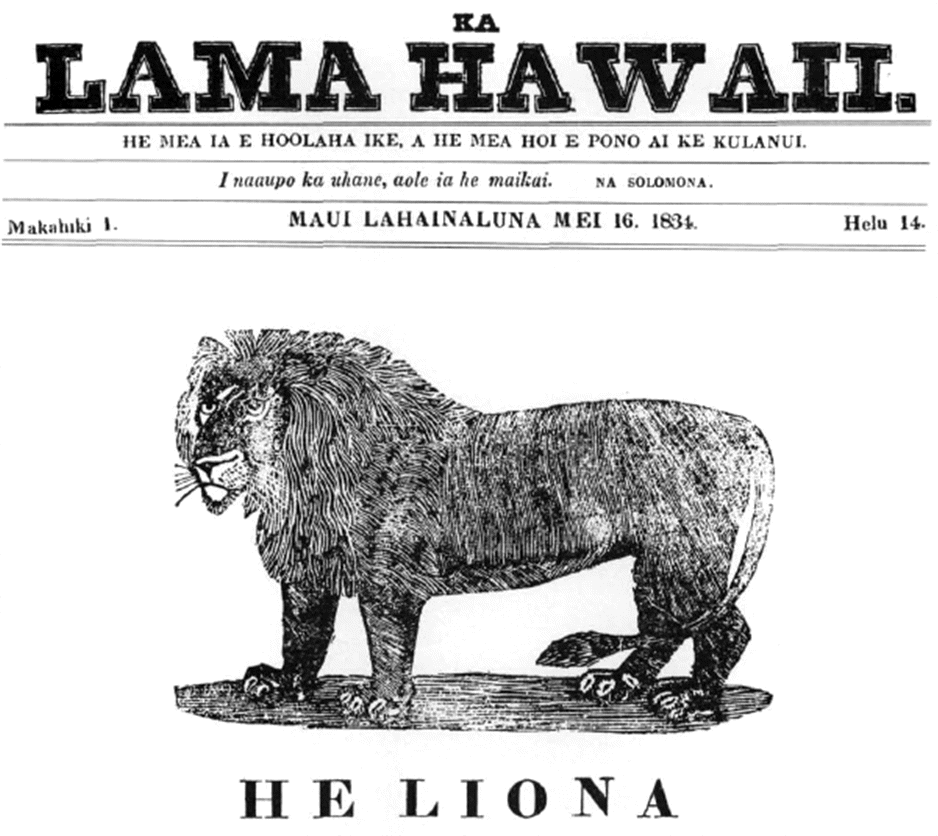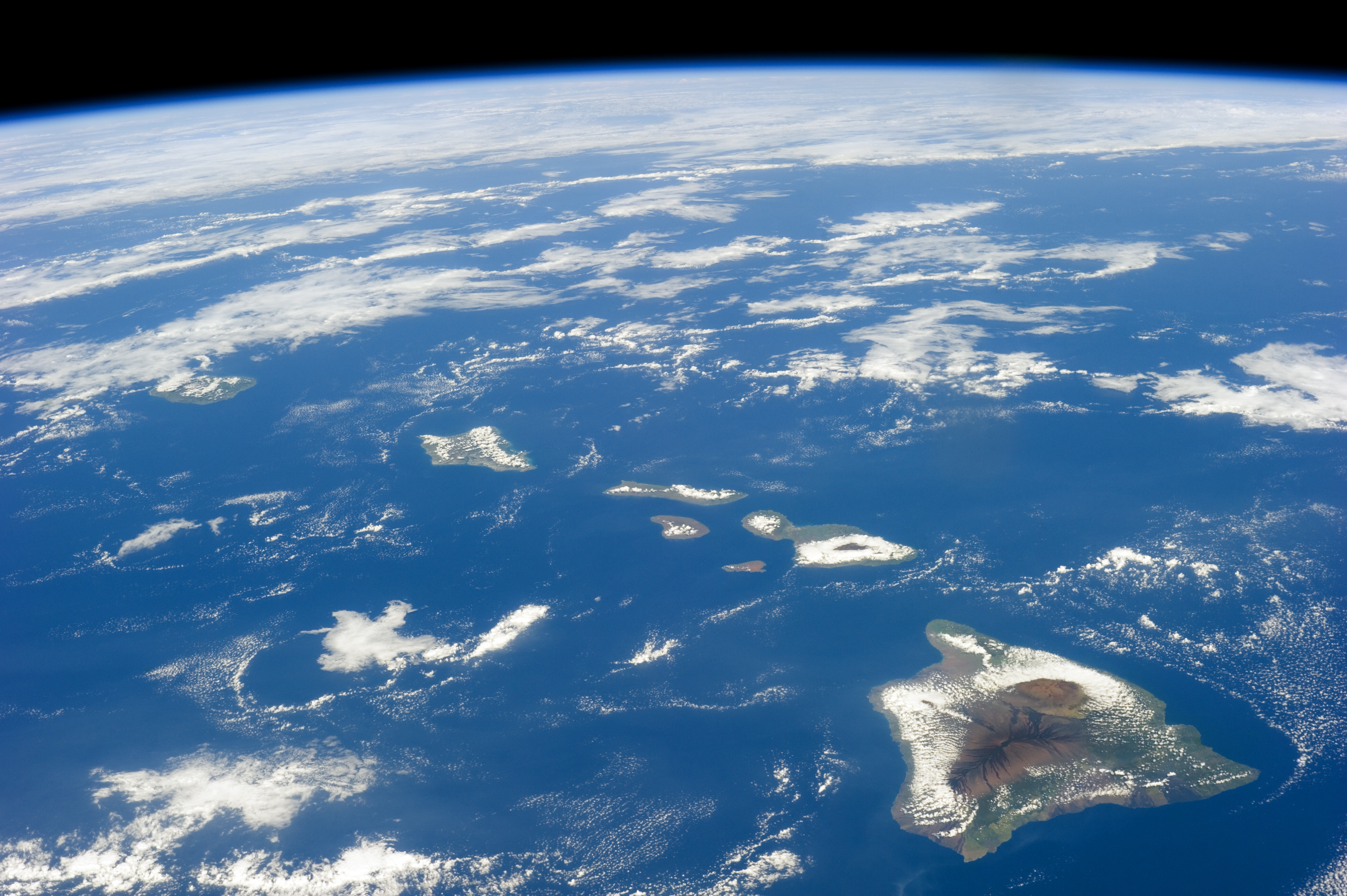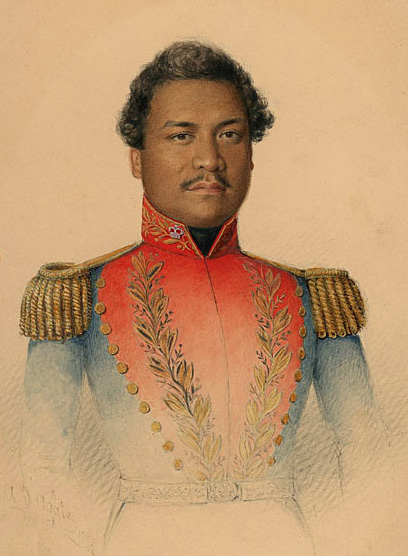|
Hawaiian Language
Hawaiian (', ) is a critically endangered Polynesian language of the Austronesian language family, originating in and native to the Hawaiian Islands. It is the native language of the Hawaiian people. Hawaiian, along with English, is an official language of the U.S. state of Hawaii. King Kamehameha III established the first Hawaiian-language constitution in 1839 and 1840. In 1896, the Republic of Hawaii passed Act 57, an English-only law which subsequently banned Hawaiian language as the medium of instruction in publicly funded schools and promoted strict physical punishment for children caught speaking the Hawaiian language in schools. The Hawaiian language was not again allowed to be used as a medium of instruction in Hawaii's public schools until 1987, a span of 91 years. The number of native speakers of Hawaiian gradually decreased during the period from the 1830s to the 1950s. English essentially displaced Hawaiian on six of seven inhabited islands. In 2001, native ... [...More Info...] [...Related Items...] OR: [Wikipedia] [Google] [Baidu] |
Hawaiian Islands
The Hawaiian Islands () are an archipelago of eight major volcanic islands, several atolls, and numerous smaller islets in the Pacific Ocean, North Pacific Ocean, extending some from the Hawaii (island), island of Hawaii in the south to northernmost Kure Atoll. Formerly called the Sandwich Islands by Europeans, the present name for the archipelago is derived from the name of its largest island, Hawaii. The archipelago sits on the Pacific Plate. The islands are exposed peaks of a great undersea mountain range known as the Hawaiian–Emperor seamount chain, formed by volcano, volcanic activity over the Hawaiian hotspot. The islands are about from the nearest continent and are part of the Polynesia subregion of Oceania. The U.S. state of Hawaii occupies the archipelago almost in its entirety (including the mostly uninhabited Northwestern Hawaiian Islands), with the sole exception of Midway Atoll (a United States Minor Outlying Island). Hawaii is the only U.S. state that is sit ... [...More Info...] [...Related Items...] OR: [Wikipedia] [Google] [Baidu] |
UNESCO
The United Nations Educational, Scientific and Cultural Organization (UNESCO ) is a List of specialized agencies of the United Nations, specialized agency of the United Nations (UN) with the aim of promoting world peace and International security, security through international cooperation in education, arts, sciences and culture. It has 194 Member states of UNESCO, member states and 12 associate members, as well as partners in the Non-governmental organization, non-governmental, Intergovernmental organization, intergovernmental and private sector. Headquartered in Paris, France, UNESCO has 53 regional field offices and 199 National Commissions for UNESCO, national commissions. UNESCO was founded in 1945 as the successor to the League of Nations' International Committee on Intellectual Cooperation.English summary). UNESCO's founding mission, which was shaped by the events of World War II, is to advance peace, sustainable development and human rights by facilitating collaboratio ... [...More Info...] [...Related Items...] OR: [Wikipedia] [Google] [Baidu] |
Creole Language
A creole language, or simply creole, is a stable form of contact language that develops from the process of different languages simplifying and mixing into a new form (often a pidgin), and then that form expanding and elaborating into a full-fledged language with Nativization, native speakers, all within a fairly brief period. While the concept is similar to that of a mixed language, mixed or hybrid language, creoles are often characterized by a tendency to systematize their inherited grammar (e.g., by eliminating irregularities). Like any language, creoles are characterized by a consistent system of grammar, possess large stable vocabularies, and are Language acquisition, acquired by children as their native language. These three features distinguish a creole language from a pidgin. Creolistics, or creology, is the study of creole languages and, as such, is a subfield of linguistics. Someone who engages in this study is called a creolist. The precise number of creole languages ... [...More Info...] [...Related Items...] OR: [Wikipedia] [Google] [Baidu] |
Pūnana Leo
Pūnana Leo (; often translated as " language nest") are private, non-profit preschools run by families, in which the Hawaiian language is the language of instruction and administration. Initially opened illegally, the first Pūnana Leo opened in 1984 in Kekaha, Kauaʻi. Based on the practices of 19th-century Hawaiian-language schools, as well as the Māori language revival kindergartens in New Zealand, the Pūnana Leo was the first indigenous language immersion preschool project in the United States. Graduates from the Pūnana Leo schools have achieved several measures of academic success in later life. As of 2022, there were a total of 11 Pūnana Leo preschools, with locations on five of the Hawaiian Islands. History The organization ʻAha Pūnana Leo was founded in 1983 by a group of Hawaiian language educators including Larry Kimura, Kauanoe Kamanā, and William H. "Pila" Wilson. Establishment of the schools involved a long political struggle, including boycotts of the ... [...More Info...] [...Related Items...] OR: [Wikipedia] [Google] [Baidu] |
First Language
A first language (L1), native language, native tongue, or mother tongue is the first language a person has been exposed to from birth or within the critical period hypothesis, critical period. In some countries, the term ''native language'' or ''mother tongue'' refers to the language of one's ethnic group rather than the individual's actual first language. Generally, to state a language as a mother tongue, one must have full native fluency in that language. The first language of a child is part of that child's personal, social and cultural identity. Another impact of the first language is that it brings about the reflection and learning of successful social patterns of acting and speaking. Research suggests that while a non-native speaker may develop fluency in a targeted language after about two years of immersion, it can take between five and seven years for that child to be on the same working level as their native speaking counterparts. On 17 November 1999, UNESCO design ... [...More Info...] [...Related Items...] OR: [Wikipedia] [Google] [Baidu] |
Republic Of Hawaii
The Republic of Hawaii (Hawaiian language, Hawaiian: ''Lepupalika o Hawaii'' [lepupəˈlikə o həˈvɐjʔi]) was a short-lived one-party state in Hawaii, Hawaii between July 4, 1894, when the Provisional Government of Hawaii had Black Week (Hawaii), ended, and August 12, 1898, when it became Newlands Resolution, annexed by the United States as an Territories of the United States#Former territories and administered areas, unincorporated and unorganized territory. In 1893, the Committee of Safety (Hawaii), Committee of Public Safety Overthrow of the Hawaiian Kingdom, overthrew Liliʻuokalani, Queen Liliuokalani, the monarch of the Kingdom of Hawaiʻi, after she rejected the 1887 Constitution of the Hawaiian Kingdom, 1887 Bayonet Constitution. The Committee of Public Safety intended for Hawaii to be annexed by the United States; however, President of the United States, President Grover Cleveland, a Democratic Party (United States), Democrat opposed to imperialism, refused. A 1894 ... [...More Info...] [...Related Items...] OR: [Wikipedia] [Google] [Baidu] |
1840 Constitution Of The Hawaiian Kingdom
The 1840 Constitution of the Hawaiian Kingdom titled was the first fully written constitution for the Hawaiian Kingdom. Overall, this version of the Constitution of Hawaii established a constitutional monarchy subjecting even the king to certain principles of democracy. Background The need for a constitution was originally intended as a manner of laws set forth to control the Native Hawaiian population with a Western style and legal framework, giving less severe punishments, such as being exiled, than was the traditional custom until the 1840s. Christianity had failed to change many behaviors of the Hawaiian population, even with the support of the families. Adultery and many other sexual relations became forbidden. Hawaiians were arrested and sentenced to severe punishments that were not well organised. The exiled had little food and could easily swim away from the islands and the prison at Honolulu Fort. The issue became worse as fewer pardons from the were available, and t ... [...More Info...] [...Related Items...] OR: [Wikipedia] [Google] [Baidu] |
Kamehameha III
Kamehameha III (born Kauikeaouli) (March 17, 1814 – December 15, 1854) was the third king of the Kingdom of Hawaii from 1825 to 1854. His full Hawaiian name was Keaweaweula Kīwalaō Kauikeaouli Kaleiopapa and then lengthened to Keaweaweula Kīwalaō Kauikeaouli Kaleiopapa Kalani Waiakua Kalanikau Iokikilo Kīwalaō i ke kapu Kamehameha when he ascended the throne. Under his reign, Hawaii evolved from an absolute monarchy to a constitutional monarchy with the signing of both the 1840 Constitution, which was the first Hawaiian Language Constitution, and the 1852 Constitution. He was the longest reigning monarch in the history of the Kingdom, ruling for 29 years and 192 days, although in the early part of his reign he was under a regency by Queen Kaahumanu and later by Kaahumanu II. His goal was the careful balancing of modernization by adopting Western ways while keeping his nation intact. Early life Kauikeaouli was born at Keauhou Bay, on Hawaii island, the largest ... [...More Info...] [...Related Items...] OR: [Wikipedia] [Google] [Baidu] |
English Language
English is a West Germanic language that developed in early medieval England and has since become a English as a lingua franca, global lingua franca. The namesake of the language is the Angles (tribe), Angles, one of the Germanic peoples that Anglo-Saxon settlement of Britain, migrated to Britain after its End of Roman rule in Britain, Roman occupiers left. English is the list of languages by total number of speakers, most spoken language in the world, primarily due to the global influences of the former British Empire (succeeded by the Commonwealth of Nations) and the United States. English is the list of languages by number of native speakers, third-most spoken native language, after Mandarin Chinese and Spanish language, Spanish; it is also the most widely learned second language in the world, with more second-language speakers than native speakers. English is either the official language or one of the official languages in list of countries and territories where English ... [...More Info...] [...Related Items...] OR: [Wikipedia] [Google] [Baidu] |
Austronesian Language Family
The Austronesian languages ( ) are a language family widely spoken throughout Maritime Southeast Asia, parts of Mainland Southeast Asia, Madagascar, the islands of the Pacific Ocean and Taiwan (by Taiwanese indigenous peoples). They are spoken by about 328 million people (4.4% of the world population). This makes it the fifth-largest language family by number of speakers. Major Austronesian languages include Malay (around 250–270 million in Indonesia alone in its own literary standard named " Indonesian"), Javanese, Sundanese, Tagalog (standardized as Filipino), Malagasy and Cebuano. According to some estimates, the family contains 1,257 languages, which is the second most of any language family. In 1706, the Dutch scholar Adriaan Reland first observed similarities between the languages spoken in the Malay Archipelago and by peoples on islands in the Pacific Ocean. In the 19th century, researchers (e.g. Wilhelm von Humboldt, Herman van der Tuuk) started to apply the c ... [...More Info...] [...Related Items...] OR: [Wikipedia] [Google] [Baidu] |
Polynesian Language
The Polynesian languages form a genealogical group of languages, itself part of the Oceanic branch of the Austronesian family. There are 38 Polynesian languages, representing 7 percent of the 522 Oceanic languages, and 3 percent of the Austronesian family. While half of them are spoken in geographical Polynesia (the Polynesian triangle), the other half – known as Polynesian outliers – are spoken in other parts of the Pacific: from Micronesia to atolls scattered in Papua New Guinea, the Solomon Islands or Vanuatu. The most prominent Polynesian languages, by number of speakers, are Samoan, Tongan, Tahitian, Māori and Hawaiian. The ancestors of modern Polynesians were Lapita navigators, who settled in the Tonga and Samoa areas about 3,000 years ago. Linguists and archaeologists estimate that this first population went through common development over approximately 1,000 years, giving rise to Proto-Polynesian, the linguistic ancestor of all modern Polynesian l ... [...More Info...] [...Related Items...] OR: [Wikipedia] [Google] [Baidu] |
Endangered Language
An endangered language or moribund language is a language that is at risk of disappearing as its speakers die out or shift to speaking other languages. Language loss occurs when the language has no more native speakers and becomes a " dead language". If no one can speak the language at all, it becomes an " extinct language". A dead language may still be studied through recordings or writings, but it is still dead or extinct unless there are fluent speakers left. Although languages have always become extinct throughout human history, endangered languages are currently dying at an accelerated rate because of globalization, mass migration, cultural replacement, imperialism, neocolonialism and linguicide (language killing). Language shift most commonly occurs when speakers switch to a language associated with social or economic power or one spoken more widely, leading to the gradual decline and eventual death of the endangered language. The process of language shift is often infl ... [...More Info...] [...Related Items...] OR: [Wikipedia] [Google] [Baidu] |





